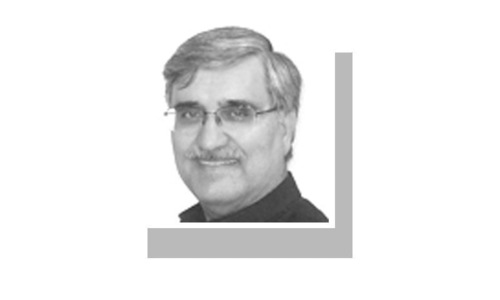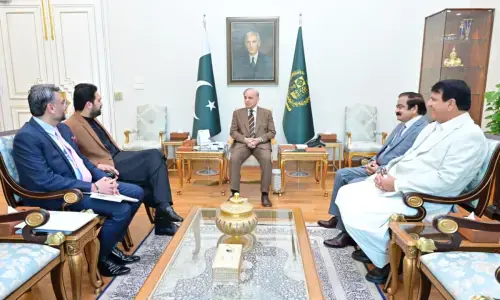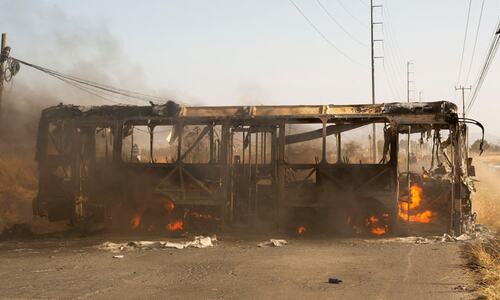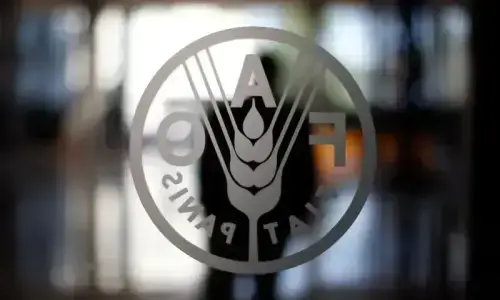Prime Minister Imran Khan on Wednesday requested National Assembly Speaker Asad Qaiser to "immediately" constitute an inter-party parliamentary committee in order to discuss electoral reforms and end the perennial issue of corrupt practices in polls.
In a letter to the speaker, the premier said this month's Senate elections had once again highlighted "the scourge of vote purchasing in the prevailing non-transparent manner of conducting elections".
On Monday, the government had shown its intention to form a bipartisan parliamentary committee under Speaker Qaiser to bring constitutional and electoral reforms in the country. The consensus on the formation of the body was reached between the speaker and Adviser to the Prime Minister on Parliamentary Affairs Babar Awan during a meeting.
“It was agreed that equal representation would be given to members of both the opposition and the government [in the committee] for their input for electoral reforms," a statement had said following the meeting, which came a day after the government extended an olive branch to the joint opposition, inviting it to sit with it for talks on electoral reforms and asking it to cancel its planned long march.
In his letter, Prime Minister Imran said he had always demanded electoral reforms to ensure transparent, fair and free elections at all levels, recalling that ahead of the Senate elections, his party had called for open ballot to ensure transparency "given how Senate elections had achieved notoriety as being a major market for purchase of votes".
Analyse: Why did Hafeez Shaikh lose?
The government also introduced a bill in this regard in the National Assembly and sought the opinion of the Supreme Court, the premier said, noting that the apex court in its judgement had asked the Election Commission of Pakistan (ECP) to ensure transparent, free and fair elections and "stated that secrecy of the ballot was not 'absolute'".
"Unfortunately the ECP paid no heed to the SC judgement and failed to carry out fair and free Senate elections," he regretted.
Imran said the "malaise" of the country's existing electoral system including "the free flow of money to purchase votes" had been criticised after every election with the losers declaring the results to have been rigged.
This trend "has now begun to destroy the entire credibility of all elections in Pakistan, casting a shadow of doubt over our entire democratic process as well as the functioning of our parliamentary system", he wrote.
The prime minister noted that the government had submitted a bill for meaningful electoral reforms to remove the "prevailing stigma attached to our electoral process".
"I would request you to immediately form an inter-party parliamentary committee to discuss these reforms and come to an agreement on how to introduce best practices including the use of technology and introduction of EVMs (electronic voting machines) to strengthen our electoral system and democracy," he told Qaiser.
Imran also suggested that a definitive time frame be decided for reaching agreement on the above issues so that "enough time is given to institute the required reforms before the next general election".
"It is in the interest of democracy in Pakistan to establish a credible and transparent electoral system and put an end to all venues that allow for corrupt practices," he stressed.
During a meeting of the National Assembly Standing Committee on Law and Justice on March 10 which had been convened to take up the Elections (Amendment) Bill, 2020, the opposition had declared that since Babar Awan was an adviser to the prime minister, he had no capacity to move the bill as only a minister, as defined in the Rules of Procedure and Conduct of Business in the National Assembly, had the authority to move a government bill.
The committee members were of the view that the bill should be referred to a parliamentary committee for consensus as constitutional amendments could not be carried out without the cooperation of the opposition.
'When the wolf looks after the sheep'
Speaking at a press conference, PML-N leader Shahid Khaqan Abbasi mocked Imran's decision to write the letter, alleging that a prime minister who "does not attend the parliament and does not know about its norms" had written a letter to a speaker who "is also unaware about the rules and traditions of the lower house".
"The country's problems won't be solved by two illiterates writing letters to each other," the former prime minister said.
"Who is the one writing the letter? [The one] whose government in Daska abducted 20 presiding officers and [ECP] staff," he alleged, referring to the premier.
Abbasi said if Imran thought the electoral system in the country had been ruined then he should catch the ones responsible for making it so, and cited the persons responsible for the irregularities in the Daska by-poll and for planting secret cameras in the Senate hall and election booth.
The PML-N leader also expressed scepticism about the premier's proposal for using EVMs in elections, asking: "When the data in these machines is disappeared, whom will we go to?"
He alleged that "today a new method is being devised to steal the elections in the country, and who are the ones making it? [Those] who are themselves complicit in stealing elections."
"You know what happens in the end when the wolf looks after the sheep? Today the wolf is asking to hand over the electoral system to him," Abbasi said.
He questioned how the inter-party parliamentary committee proposed in the letter could function in a parliament "which isn't functioning and has no decorum".
Abbasi lashed out at the National Assembly speaker, accusing him of obstructing members of the opposition while adopting silence on the behaviour of the treasury benches and the prime minister.
"The speaker gains the trust of the opposition with his display of neutrality. This is a speaker who doesn't let the leader of the opposition speak [in parliament]," he alleged.
"This speaker also deprived the people of Pakistan of their representatives coming in the assembly and doing their representation."


































